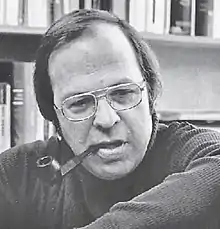C. Scott Littleton
Covington Scott Littleton (July 1, 1933 – November 25, 2010) was an American anthropologist who was Professor and Chair of the Department of Anthropology at Occidental College. A co-founder of the Journal of Indo-European Studies, Littleton was an expert on Indo-European mythology and Shinto, on which he was the author of numerous works.
C. Scott Littleton | |
|---|---|
 | |
| Born | 1 July 1933 Los Angeles, California |
| Died | 25 November 2010 (aged 77) Pasadena, California |
| Citizenship | USA |
| Partner(s) | Mary Ann Wuest |
| Children | 2 |
| Academic background | |
| Alma mater | |
| Academic advisors | Jaan Puhvel |
| Influences | Georges Dumézil |
| Academic work | |
| Discipline | Anthropology |
| Institutions |
|
| Main interests | |
Biography
Covington Scott Littleton was born in Los Angeles, California on July 1, 1933, and grew up in Hermosa Beach, California.[1] He was the son of Covington Scott (an investigator and writer) and Adelaide Littleton. Littleton served in the United States Army in Korea during the Korean War, having lied about his age in order to get into the army.[2]
Attending El Camino College from 1952 to 1954, Littleton subsequently studied at the University of California, Los Angeles, where he received his A.B. (with the highest honors) in 1957, M.A. in 1962, and Ph.D in anthropology in 1965.[2] He was the Graduate Commencement Speaker at University of California, Los Angeles in 1965.[3]
Littleton's 1965 PhD dissertion was published in 1966 under the title The New Comparative Mythology: An Anthropological Assessment of the Theories of Georges Dumézil. He played an important role in disseminating Dumézil's theories Trifunctional hypothesis to an English-speaking audience.[3] Littleton's work on the theories of Dumézil is still considered the most comprehensive source on the subject.[4]
Littleton was a research assistant in folklore center at University of California, Los Angeles from 1961 to 1962. Since 1962, Littleton worked as Occidental College as Assistant Professor of Anthropology (1962-68), Associate Professor of Anthropology (1968-80), Chair of the Department of Sociology and Anthropology (1967-72, 1974-93), and Professor of Anthropology and Chair of the Department of Anthropology (1994-98).[2] He continued to lecture at Occidental until 2002.[1] Littleton was a member of the Editorial Board of the Journal of Indo-European Studies from its inception, and served as its Mythology Editor since 2000.[2][3]
Littleton specialized in the study of religion, mythology and folklore, particularly Shinto, King Arthur and Indo-European mythology. He was the author of numerous works on these subjects.[2] He also authored a personal memoir and numerous works of science fiction. Altogether, Littleton authored hundreds of articles, reviews, monographs and other publications throughout his career.[3]
Littleton was the member of a large number of scholarly organizations. He was a Fulbright Scholar and a member of Phi Beta Kappa.[3]
Littleton died of pneumonia after complications from heart surgery at Pasadena, California on November 25, 2010.[2][1]
Personal life
Littleton married Mary Ann Wuest on 26 August 1961, with whom he had two daughters, Leslie and Cynthia. He was a member of the Democratic Party and an avid runner, cycler, swimmer, photographer, and reader of science fiction.[2]
Selected works
References
- Los Angeles Times. September 5, 2010. p. 37.
- Contemporary Authors. January 12, 2011.
- Malcor 2011, pp. 230-231.
- Miller 2011, pp. 496-498.
Sources
- Malcor, Linda (November 25, 2011). "C. Scott Littleton". Journal of Indo-European Studies. Institute for the Study of Man. 39 (1–2): 230–231. Retrieved September 4, 2020.
- Miller, Dean (November 25, 2011). "C. Scott Littleton". Journal of Indo-European Studies. Institute for the Study of Man. 39 (3–4): 496–498. Retrieved September 4, 2020.
- "C. Scott Littleton". Los Angeles Times. September 5, 2010. p. 37. Retrieved September 4, 2020 – via Newspapers.com.
- "C. Scott Littleton". Gale Literature: Contemporary Authors. Gale. January 12, 2011. Retrieved September 4, 2020.